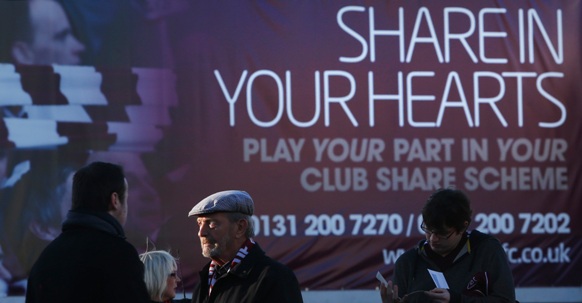Senior female football executives used to be something of a rarity. These days they are no longer such a novelty but not all of them are prepared to do the job without taking a salary or take a gamble by coming out of retirement to save their local club.
It was one of the most notorious cases of foreign ownership going disastrously wrong and Budge, being a local and highly regarded businesswomen, was asked to try and put Hearts back on its feet. “They were very worried that the previous administration was going in entirely the wrong direction with all the financial mismanagement,” she explained.
Budge agreed to put together a business plan with a group of colleagues but not to purchase the club – not at that stage anyway. “There’s a phrase I once heard which goes ‘how do you become a millionaire in football? The answer is you start off as a billionaire!”
In other words, Budge was not prepared to simply throw money into football for the sake of it without any guarantees. She soon realised, however, that those trying to save Hearts were doing it with the best intentions. “They had no personal agenda but simply didn’t want their beloved club to disappear. That was good enough for me.”
As she got the business bug again, Budge bought a majority stake in 2014 for £2.5m as part of a deal to take the club out of administration (the most viable way of having the previous regime’s shareholding transferred), with a plan to eventually sell it to fans’ group Foundation of Hearts.
But the summer before, it very nearly all went belly-up. Budge was on holiday on her yacht in the Mediterranean (“minding my own business”, as she put it) when the phone rang with a plea for help. Hearts had already been relegated having been penalised 15 points for going into administration with £25m debts but it could have been far worse.
“To cut a long story short, we came within hours not of going not into administration but into liquidation,” said Budge. “We were very close to the club disappearing altogether. The history and heritage mattered so much so we had to stop that happening.
“I had never really wanted to buy a football club, it wasn’t one of my aspirations but I decided I would help get it going and then sell it back to the supporters.”
To do that, she provided the administrators with upfront capital investment of £2.5 million of her own money to get the club back on its feet, on condition that the supporters group eventually paid the money back. Incredibly, almost overnight, 8,000 fans agreed to pay a minimum of £10 a month by direct debit but Budge didn’t want anyone from outside upsetting the apple cart management-wise given what had happened under the previous administration.
 |
“I said that if I was putting the money up, I was running the show and making the decisions. To be honest, there wasn’t anyone else anyway. The club was in a terrible state. The money the previous lot had poured in wasn’t real yet they were paying ridiculous wages.
“When I looked at all the files and the contracts, I was absolutely staggered. It was total mismanagement, there was no income. Very soon thereafter, the bank he ostensibly owned itself went into administration. It was a terrible mess.”
The whole Romanov experience was a sobering experience and on day one of taking over, Budge paid off the football creditors to clear the outstanding debt. It soon became clear, however, the whole club needed restructuring, not least rebuilding the antiquated main stand that was 103 years old. “It was time to knock it down,” says Budge, “as it was not even fit for purpose.”
No sooner had Heart’s final home fixture of 2017 ended than the diggers and builders moved in. Six months later, after a spell at Murrayfield, the club moved back to Tynecastle, with an immediate knock-on effect on revenue.



